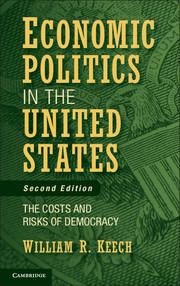Book contents
- Frontmatter
- Contents
- List of Figures and Tables
- Preface to the Second Edition
- Preface to the First Edition
- Part One Introduction
- Part Two Models of Macroeconomic Politics in a Democracy
- Part Three The Sources and Authority of Macroeconomic Goals
- Part Four Institutions and Processes
- Part Five Conclusion
- References
- Index
Preface to the First Edition
Published online by Cambridge University Press: 05 June 2014
- Frontmatter
- Contents
- List of Figures and Tables
- Preface to the Second Edition
- Preface to the First Edition
- Part One Introduction
- Part Two Models of Macroeconomic Politics in a Democracy
- Part Three The Sources and Authority of Macroeconomic Goals
- Part Four Institutions and Processes
- Part Five Conclusion
- References
- Index
Summary
This book uses macroeconomic issues to address questions about how democracy works. It continues the kind of investigation I pursued in my first book, The Impact of Negro Voting: The Role of the Vote in the Quest for Equality (1968, 1981), which used racial issues to study the consequences of extending the franchise. It is a statement of applied democratic theory that uses economic issues to bring into focus questions about democratic institutions and practices. It brings together a body of research that has been written largely in the past fifteen years on the political dimensions of macroeconomic policy and performance. The book draws on work done by economists and by political scientists in roughly equal measure, and it is designed to present a variety of arguments fairly and neutrally.
I have taken aim at several audiences. First, the book is written to be accessible to a nontechnical audience of advanced undergraduates and thoughtful nonacademic citizens who might be interested in the relationship between politics and the macroeconomy, and in its implications for democratic theory. No special training in economics or political science is presumed. Although the book is meant to be readable by the nontechnical general public, it draws heavily on technical academic literature. As such, it makes the case that this literature is relevant to issues of broad public concern. Another audience is graduate students and faculty in political science and economics. For them, the book covers territory in the other discipline that may not be familiar, but more than this, it is an argument and an interpretation of known political and economic facts and ideas. In this way, it is also designed for the colleagues who have created the literature on which I draw.
- Type
- Chapter
- Information
- Economic Politics in the United StatesThe Costs and Risks of Democracy, pp. xvii - xxPublisher: Cambridge University PressPrint publication year: 2013

